War in the Context of Everything Else1
The first move is to do a forensic analysis of all previous anomalous events that have the potential to have been an unrecognized attack. Where have they hit you that you might have attributed to something else? When did it start? Who is enabling them? Who are the active participants on the inside? What are the elements of the WICEE? Can we discern a strategic plan? I say, "Yes We Can!" (sorry couldn't resist).
At this point, there is no doubt that the economy is collapsing and despite what the propaganda whores of the media tell you, the collapse was absolutely predictable. I'm not an expert in economics. My sole claim to fame in that arena was that I did a paper on the American Post-Industrial Economy for a class I took in the early 90's. Whoopidity-Doo. But it did make me think about the structure of the economy - the distribution of knowledge jobs relative to the number of blue collar jobs. The conclusion of my paper was that we should be very concerned about the export of those blue collar jobs and that it should stop because the majority of the people who held those jobs didn't have the "tools" for the Information Economy, nor did they have the time in life to make the adjustment. And in the long run, there is a significant percentage of the population who can never participate in the Information Economy. So around 2001 when I found out about the export of knowledge jobs to foreign countries, I knew our economy would collapse within 10 to 15 years.
"All war is deception"
"Be extremely
subtle, even to the point of formlessness.
Be extremely mysterious,
even to the point of soundlessness. Thereby you
can be the director of
the opponent's fate."
Supply Side Economics = Corporatism
You've
probably heard this a hundred times, "a poor man doesn't
hire another poor man". That much is true.
But it is also true, that "a rich man will hire and exploit
the cheapest labor he can find - up to and including slave
labor". And it was the pursuit of the cheapest labor in
the world that is causing the 'Great Unwinding' of our
economic system and potentially the collapse of our nation.
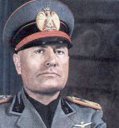
Fascism should rightly
be called Corporatism as it is a merger of state and
corporate power ~
Benito
Mussolini
The Fraud of "Free Trade"
On March 14, Patrick Mulloy of the U.S.-China Economic & Security Commission was on C-Span to talk about a report they just produced about the trade deficit with China. Mr. Mulloy was a Congressional Staffer for the Senate banking committee in 1980's when the decisions were being made on U.S. economic policy. His segment was about 30 minutes long but if time is a constraint, to the right, just listen to an audio recording of the last caller.
The following is a snippet from the call:
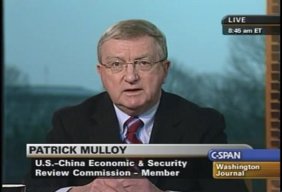
Mulloy: …They call these ‘free trade agreements’…We concluded that this [NAFTA] is more of an investment agreement. What this is doing is providing the opportunity for people to invest in the other country and then to be able to ship their goods back into the United States at a lower tariff than they would have had… When we are talking about these ‘free trade’ agreements a big part of it is an investment - for the company to invest and then ship back.
"Investing in the Other Country and Shipping Back In"
There is no "on-off" switch with economic policy. It takes time for corporations to shift their business models when the law changes. In the case of NAFTA, clearly, the incentives were for corporations to move their production to Mexico where the labor was cheap and there was no penalty for doing it because they could ship their goods back into the United States for "free". So "Free Trade" was about bigger corporate profits at the expense of the American economy and the American workers who lost jobs as corporations moved their production facilities to Mexico.
The following is an excerpt from a 1998 Congressional Research Service Report titled, "Maquiladoras and NAFTA: The Economics of U.S.-Mexico Production Sharing and Trade":
Maquiladoras clearly have prospered under these incentives. In 1975, they employed 67,214 workers in 454 plants producing $1 billion worth of goods. By 1996, there were 754,858 employees in 2,411 plants with a total production of $35 billion. Investment is heavily dominated by U.S. businesses, but Asian and European interest is growing. Of the total registered maquiladoras in 1995,43% were wholly owned by Mexican interests, 38% by U.S. parties, and 14% by Mexican-U.S. partnerships. Most of the Mexican-owned plants, however, were under contract with U.S. firms. Approximately 2% came under Japanese ownership and 3% were owned by other foreign interests.5
This is where the propaganda whores of the media come in with their campaigns of "Free Trade" is good! It means economic prosperity for all! Transportation jobs were created along the border with Mexico, but the North Eastern industrial states and the textile states hemorrhaged jobs - destroying lives and local economies. The mitigation for the loss of a job was "Trade Adjustment Assistance" - retraining for a different job.
Here is another excerpt from the report:
Some call for slowing economic integration, including rethinking the U.S. commitment to NAFTA (and free trade in general) to alleviate the adjustment problem. Others believe that those low-skilled workers facing employment problems will not find lasting relief based on any type of barriers to international economic relations. Studies have found that wage stagnation and job losses in this group are, for the most part, not the result of trade, but as noted by the International Monetary Fund, represent a broader trend "driven principally by advances in technology that favor skilled labor."17 From this perspective, the solution is to be found in domestic rather than trade policy. The oft-repeated policy suggestions include supporting trade adjustment, first on a short-term basis by helping marginalized members of society to weather economic transition (the social safety net issue) and second, on a more permanent basis, by helping them learn to function in an increasingly competitive global economy (the education and training issue). This emphasis encourages response to, rather than confrontation with, global trends.
That paragraph highlights the fraud of "free trade". Corporations moved down to Mexico to lower their costs of production (cheap labor) but Americans are told that the reason they lost their job was because of technological advances and that they will have to become more highly skilled. The American people were told that in the global economy, there are winners and losers - and if you are a loser, just suck it up.
The truth is that every time a job is exported from the United States, we are all losers because those losses ripple through the entire economy. The net effect on the U.S. economy was a loss of middle class jobs, the losses to the tax base - federal, state and local, increased social costs for re-training, unemployment insurance, food stamps, welfare, etc. Taxes on everybody who still had a job go up to cover the loss of taxes collected from the people who lost their jobs.
Exporting Knowledge Jobs - Importing Cheap Labor
In 1995, when the U.S. signed the agreement for the Uruguay Round of trade agreements creating the World Trade Organization, the agreement included a provision to allow "trade in services" which was a global arrangement to allow the same kind of "investment in the other country" for the Knowledge Industries - exporting the high dollar knowledge jobs - and importing foreign cheap labor - which puts American citizens out of work on both sides of the export/import equation.
From the first "Free Trade" agreement that was signed to benefit corporations at the expense of our nation as a whole, all economic policy decisions since that time have exacerbated the problems rather than fixing them. National policies across the board have been to try and mitigate national losses to protect corporate profits. But the corporate profits are offshore - earned in foreign countries subject to taxation only upon repatriation which is voluntary. With corporate profits as the first priority of economic and social policy, it effectively turns U.S. policy on it's head. Those agreements exported American wealth and imported Third World Poverty. 'Free Trade' was the first identifiable front in the WICEE war on the American people.
Global Corporatism
The term "globalization" is synonymous with corporatization - on a global scale. Another way of saying it is that globalization is global corporatism.
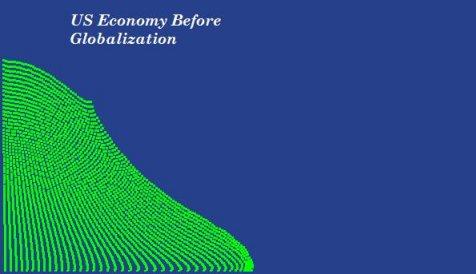
Tax obligations to support the infrastructure of the United States was shared more equally because everybody contributed.
The commercial market for labor provided the incomes necessary for a well functioning economy providing jobs at the low end and upward mobility for those who had the ambition to strive for it.
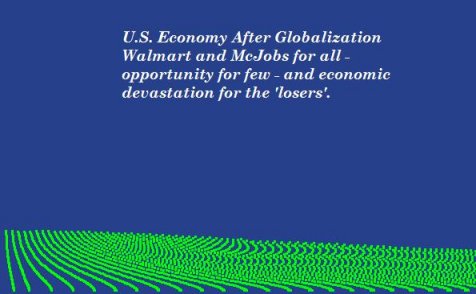
The U.S. economy will never recover under these conditions. The standard of living for the American people will drop to third world levels and our infrastructure will crumble from lack of capital from a solid foundation (savings) to rebuild it.
Illusions and Delusions
A WICCE war would not be possible without a media "arrangement" between corporate and government power centers. It's difficult to know when this really started because American media has always been corporate sponsored but thanks to an article titled "The Control of the American News Media" by James Kelso, we know the following:
A covert policy, formulated by Ronald Reagan in conjunction with the CIA, was termed “perception management” and was formalized on January 14, 1983 when President Reagan signed the National Security Decision Directive No. 77. The Reagan White House and the CIA felt that a resurrection of anti-war activism in the United States as had occurred during the prolonged and futile Vietnamese war could curtail or halt the Reagan/CIA policy of “aggressive containment,” specifically in Central America.
This project was also called ‘public diplomacy’ and while it was ostensibly created to develop American public support for Reagan’s foreign policy, it also was constructed to effect control over the opinions of the American public through control of the American media, both TV and press reportage.
Under the “perception management/public diplomacy” program, the CIA was instructed to take a number of steps to bring the American public’s perceptions into line with an official U.S. governmental policy.
The justification given for the policy was due to retrospective analysis of social conditions during the Viet Nam era but, with the benefit of hindsight and all that has transpired since 1983, one has to consider that the policy might actually have been enacted for prospective purposes. With those purposes being to keep international agreements out of the News, to divert the public's attention when important world events are occurring, to frame public perception towards the 'solutions' for the Hegelian Dialectics played out to serve the 'Corperament' policies. [Note: if there is a word for 'corporate government' I don't know it so from here on out, when I say government, I mean the corporatist government - "Corperament" and not the American government.]
Consolidation of Political Power
In June of 1982, Ronald Reagan gave a stunning speech to the British Parliament in which he said, "...a moment of kinship and homecoming in these hallowed halls". One might be tempted to think that he was just being polite, but one finds the true meaning of words spoken in the past by tracing the actions that followed the words. Do a little research to see how many "American" leaders have been knighted for their "service to the queen". SLAVERING DOGS!
The following is a page copied from the history of the National Endowment for Democracy published in 'Commonsense' in December of 1983 (Adobe Page 7):
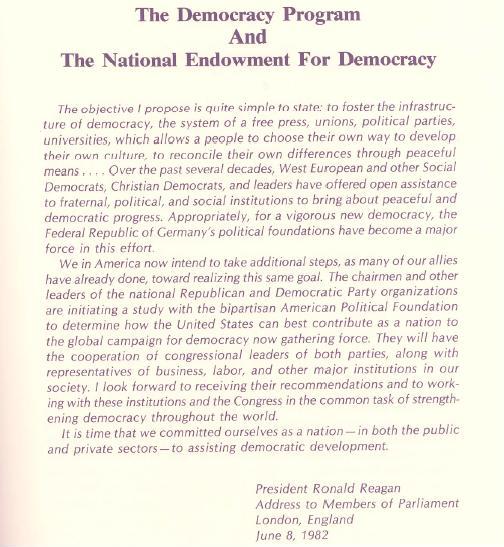
"Eighteen months after President Reagan's historic 1982 speech to the British Parliament, history of another sort was made. Responding to his proposal for an American effort to assist democratic institution building abroad, Congress voted to authorize the National Endowment for Democracy which will assist private efforts by labor, business, and the two political parties to help others "foster the infrastructure of democracy".
That means that December of 1983 was the year that political power in the United States was consolidated in the NED soviet ("soviet" meaning council). The following is from an article in Commonsense titled, "The Democracy Program: A Strong Foundation" written by William Brock. At the time it was written, Brock was the United State Trade Representative, former Chairman of the Republican National Committee and former senator from Tennessee.
Beginning Adobe page 11:
Over the last several decades, requests from the Third World and other countries asking the U.S. for assistance in developing democratic institutions have steadily increased. The Republican and Democratic Parties, the business community, the labor movement--all have received numerous requests. But while the AFL-CIO and business groups have been able to offer aid, for the most part, our international counterparts have not been able to gain the support they need from the U.S.
A Program for Democracy
Many political, business, labor, academic, and other leaders have long been aware of the need for a long-range bipartisan approach to democratic institution-building. Congressman Dante Fascell (D-Fla.), for example, has been a staunch advocate of creating a permanent legislative mechanism that would encourage the American private sector to assist counterpart groups abroad and since the 1960s he has been pushing for the establishment of institutions to support such efforts.
During my chairmanship at the Republican National Committee, I became deeply convinced of the need for increased international activity by both political parties and by other private sector groups. Early in 1979, I was privileged to meet with then candidate Margaret Thatcher and a number of her colleagues. As a result of those meetings, I became persuaded that the American Republican and the British Conservative parties had much to learn from each other and much to contribute to newly created parties in other countries, particularly in the Third World.
Charles T. Manatt, chairman of the Democratic National Committee and then chairman of the DNC’s Finance Council, enjoyed similar experiences and also became a supporter of the idea. Together with other leading party officials, Chuck Manatt and I created the American Political Foundation as a bipartisan vehicle to forge a broader role for political parties abroad. At the same time, Michael A. Samuels, now vice president of the U.S. Chamber of Commerce’s international division, and William A. Douglas, a consultant to the AFL-CIO’s American Institute for Free Labor Development, provided a conceptual foundation for supporting democracy internationally in a 1981 Washington Quarterly article. They concluded that:
U.S. national interests require a program for providing political aid to strengthen democratic pluralism in other countries. Since the advent of the Cold War, the United States has worked abroad politically, mainly covertly, with direct government action and secret financing of private student, cultural, and labor groups. The covert approach has proven inadequate. Experience in the fields of education, labor and cooperatives shows that overt government financing of U.S. private groups working in politics abroad would be more effective than the covert approach has been.
Samuels and Douglas specifically called for creation of a new private sector institution that could receive government funds that would remain independent of any administration. Such an effort, they felt, should include input from political parties, business, labor, academic, and other groups.
By early 1982, these ideas burgeoned into a series of meetings sponsored by Mike Samuels and myself and included representatives of the U.S. Chamber of Commerce, the Republican and Democratic Parties, the Administration, the AFL-CIO, and academia. Out of these gatherings came the decision to launch a study to see if a permanent mechanism could be designed to encourage private sector groups to become involved in strengthening democratic institutions and values on an international level. A formal proposal was then made to President Reagan, through the American Political Foundation, to create a study called the Democracy Program. The President heartily endorsed the idea and announced creation of the study during his historic speech to the British Parliament on June 8, 1982.
National Endowment for Democracy
Upon examination of the structure of NED, it clearly represents the consolidation of political power and it would be the policy coordinator and funnel for the shadow government designed to mask the true structure which is by definition, totalitarian.
"The Center for International Private Enterprise is a non-profit affiliate of the U.S. Chamber of Commerce and one of the four core institutes of the National Endowment for Democracy."
Board of
Directors
Thomas J Donohue (R)
Mike McCurry (L)
Eliot Schrage, VP Communications & Global Affairs,
GOOGLE, INC.
"In its infancy, IRI focused on planting the seeds of democracy in Latin America. Since the end of the Cold War, IRI has broadened its reach to support democracy and freedom around the globe. IRI has conducted programs in more than 100 countries and is currently active in more than 70 countries.
John McCain, U.S. Senator
Working for Mexico
J. William Middendorf, Former U.S. Ambassador to the European Community, Organization of American States, and the Netherlands.
L. Paul Bremer, In charge of the "hose up Iraq for perpetual war" team.
"NDI
works with democrats in every region of the world to build
political and civic organizations, safeguard elections, and
to promote citizen participation, openness and
accountability in government."
“You need something that is transparent, something that is open, something that is nongovernmental,” Gershman continued, supporting the McMillan-Scott proposal, “so that you can continue to operate without being constrained by the diplomatic concerns and priorities of the European Union.”
"To tackle the enormous
challenges workers face in the global economy, the
American Federation
of Labor-Congress of Industrial Organizations (AFL-CIO)
— the national federation that represents millions
of working women and men in the United States — launched the
American Center for International Labor Solidarity in 1997."
Worker-to-Worker Solidarity Committee to AFL-CIO
"Cut All Ties with NED"
And NED has been very busy around the world - spreading "democracy" and fomenting revolution. The following is an excerpt from a speech given by George Bush on June 6, 2005:
"We come together at a great moment in history, when freedom is on the march around our world. In the last year-and-a-half -- think about this -- we've witnessed a Rose Revolution in Georgia, an Orange Revolution in Ukraine, a Purple Revolution in Iraq, a Tulip Revolution in Kyrgyzstan, a Cedar Revolution in Lebanon -- and these are just the beginnings. Across Central Asia, hope is stirring at the prospect of change -- and change will come. Across the broader Middle East, we are seeing the rise of a new generation whose hearts burn for freedom -- and they will have it."
U.S. and European Officials Examine “Backlash against Democracy” at IRI Sponsored Seminar
FOR IMMEDIATE RELEASE
March 27, 2007Bratislava, Slovakia – As the promotion of democracy and human rights assumes an increasingly important role in the United States and the European Union (EU), democracy promotion is experiencing a backlash in many countries around the world, confronting deliberate measures by regimes to frustrate freedom’s progress and suppress human rights.
Note: Why would we be spreading "democracy" when we have a Republic? At least we're supposed to have a Republic.
Shadow Government
Proving there is a shadow government even with the evidence of consolidation of political power would be difficult were it not for a providential coincidence. I was listening to Alex Jones yesterday and his guest Jim Marrs. Mr. Marrs mentioned a speech given by Barack Obama's National Security Advisor, retired General Jim Jones. In the speech which is posted on the Council on Foreign Relations website, Jones says the following:
Remarks by National Security Adviser Jones at 45th Munich Conference on Security Policy
Published February 8, 2009
Speaker: James L. Jones
Consolidation of Military Power
George H. W. Bush began the consolidation of the military power structure when he dissolved the Strategic Air Command (SAC) and stood up STRATCOM. STRATCOM’s job was to consolidate the leadership in the military. He severely cut the military budget to justify the consolidation of leadership - the consolidation of power within the military even though it was blamed on Clinton.
"In 1992, Offutt Air Base faced monumental changes when the easing of world tensions allowed the United States to reorganize its Air Force. After 46 years, SAC was deactivated on June 1, 1992, and a new, unified command, STRATCOM was activated. The beginning of STRATCOM coincided with the change from a world with two super-powers facing each other to a world with one super-power and many other powerful nations and coalitions of power."
And he put all U.S. nuclear weapons in the hands of one person:
1995 - General Butler was the chief architect with dissolving SAC and the start-up of the United States Strategic Command (STRATCOM). He worked very closely with General Colin Powell, Chairman of the Joint Chiefs of Staff, on the roles and missions and structure of STRATCOM. The only question was when would the change take place. STRATCOM took over the same mission of SAC, but with one twist. STRATCOM has authority over all nuclear weapons.[2]
Roles and Missions Commission of the Armed Forces - Report to Congress, 1995
"The central purpose of the Department of Defense is to conduct effective military operations in pursuit of America's National Security Strategy. The central message for DoD from the Commission on Roles and Missions of the Armed Forces is, in the 21st century, every DoD element must focus on supporting the operations of the unified commanders in chief. Everything else DoD does, from furnishing health care to developing new weapons, should support that effort. The recommendations made throughout our report seek to concentrate all of DoD's activities toward that end.
Military operations are performed by geographic and functional CinCs under the authority and direction of the president and the secretary of defense. To be successful, the CinCs must mold effective unified forces from the diverse array of capabilities provided to them by other organizations. This means that the CinCs must have a role in helping determine the capabilities that will be available; it also requires the close cooperation of the military departments and the services, support agencies and decision-makers in DoD. The department has strengthened its capabilities for unified operations considerably since passage of the 1986 Goldwater-Nichols [Department of] Defense Reorganization Act. But that job is not yet done; further efforts to ensure the effectiveness of joint operations are essential to a successful and secure future.
Our recommendations are designed to better focus DoD's traditional military functions, management and decision-making processes, and support elements more directly on effective unified military operations. In short, we must accelerate the process of thinking differently about defense. Military operations are planned and conducted by joint forces under the direction of the CinCs, not by the military services, defense agencies or Pentagon staffs."
Eberhart To Head U.S. Northern Command
"(wore) three hats as the commander in chief of both U.S. Space Command and the North American Aerospace Defense Command and as Defense Department manager for Space Transportation Systems Contingency Support, all at Peterson. He has served as head of Space Command since Feb. 22, 2000."
The commander of the U.S. military's space and continental air defense assets has been chosen to lead the nation's premier military homeland defense organization.
Air Force Gen. Ralph E. Eberhart has been nominated by President Bush to command the soon-to-be established U.S. Northern Command, Defense Secretary Donald H. Rumsfeld said today in a Pentagon news briefing. The nomination requires U.S. Senate confirmation, DoD officials noted.
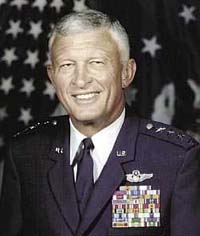
General Ralph Eberhart
Secretary Rumsfeld is responsible for directing the actions of the Defense Department in response to the terrorist attacks on September 11, 2001. The war is being waged against a backdrop of major change within the Department of Defense. The department has developed a new defense strategy and replaced the old model for sizing forces with a newer approach more relevant to the 21st century. Secretary Rumsfeld proposed and the President approved a significant reorganization of the worldwide command structure, known as the Unified Command Plan, that resulted in the establishment of the U.S. Northern Command and the U.S. Strategic Command, the latter charged with the responsibilities formerly held by the Strategic and Space Commands which were disestablished.
And now the military is "partnering" with law enforcement - militarizing the police - and setting up surveillance "Fusion Centers" on American soil to surveil American citizens as if American citizens were the enemy.
The Radical Polarization of Law Enforcement
"Patriots, Christians and concerned citizens are increasingly in the cross hairs of the U.S. intelligence community, and battle lines are being quietly drawn that could soon pit our own law enforcement and military forces against us."
Civilian Data Fusion Center
Point, Click and Disable Your Breaks
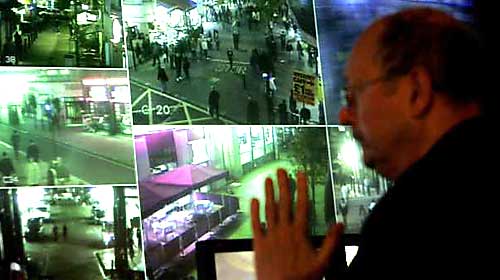
Same System as Military Fusion Center
Killing as a Video Game
Just to recap where we are, we know that we have a "partnership" between the institutions of political power, business, labor, and the two political parties. We have a controlled media. We have a crashing economy due to the deliberately subversive and deceptive "free trade" agreements. We've had consolidation of military power to a unified command structure across services within a global military with regional assignments. And we have the militarization of our domestic police forces "partnering" with the military in violation - in spirit if not in point of law - of Posse Comitatus. And we have Homescam Security "Intelligence Fusion Centers" describing concerned American citizens as domestic terrorists.
End of Part 1 of "War in the Context of Everything Else"
- To Be Continued -
Vicky Davis
March 21, 2009
For my part, whatever anguish of spirit it may cost, I am willing to know the whole truth; to know the worst and provide for it ~ Patrick Henry
___________
1] 'War in the Context of Everything Else' is a term I picked up from Thomas P.M. Barnett. It's my belief that Barnett is the Communicator of the Agenda for the people who executed the coup d'etat on the United States - net-centric warfare.


